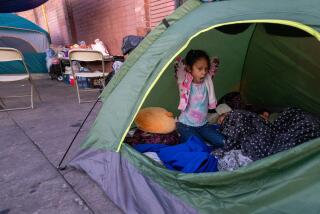Immigrant Parents Urged: ‘Spare the Rod’
- Share via
NEW YORK — At a Haitian church in Jamaica, Queens, 12 immigrant women recently gathered for a class in parenting--the third of 15 sessions. The goal is to avoid a clash of cultures that can result in parents losing custody of their children.
“You’re in the supermarket and your child keeps touching everything,” said Anne-Marie Domond, a Haitian-born city social worker. “What do you do?”
The women answered that they would tell the child to stop it.
“Right,” Domond said. “You make her understand that she is not supposed to touch the things.”
“But what if she doesn’t stop?” one mother asked.
The others laughed and said that they would then spank the child.
But the consequences are no laughing matter, because in this state spanking can be grounds for the Child Welfare Administration to investigate the family and potentially jail the parents and take custody of the children.
While local agencies don’t track how many child-abuse and neglect investigations involve immigrants, some community advocates worry that this group is at especially high risk. They charge that caseworkers are too quick to remove children and jail their parents for using disciplinary methods--spanking and whipping with a belt or a switch--that often constitute good parenting in their home countries.
“People will say, ‘This is my kid. I’m the boss,’ ” said Marie Pierre-Louis, a family-support worker for the Haitian Centers Council in Brooklyn. “I have to explain that in this country it’s not like that. The government has an eye on your kid.”
Once in the court system, the immigrants’ difficulties are compounded by language barriers and the inability to pay for private lawyers, Pierre-Louis said.
New York’s child welfare workers were sharply criticized last year in the press because 26 children died the previous year after being left with parents under investigation for abuse or neglect. Agency heads say they don’t have the time or the duty to draw fine cultural distinctions.
“We alert the workers that they have to tread carefully and respect other people’s cultures,” said Anthony R. Cucchiaro, executive director of the Child Welfare Administration’s caseworker-training academy. “But the bottom line is they’re here in New York, and they have to abide by our rules.”
State law forbids “excessive corporal punishment,” vague terminology that social workers must interpret case by case. For parents who were themselves disciplined with spankings or whippings and who come from countries that don’t regulate how parents discipline their children, defining what is excessive can be difficult.
Parenting throughout Asia, the Caribbean, South America and the Middle East is based on the philosophy of “Spare the rod and spoil the child,” explained Salvador Minuchin, co-chairman of the Mayor’s Task Force on Child Abuse Prevention. So community groups try to get the word out to newly arrived immigrants.
“We tell them that disciplining your child in ways that are accepted in Korea can get you arrested here,” said Ji Young Kim of the Korean American Family Service Center.
But teaching immigrants American-style parenting can be complicated by a general vagueness about what constitutes abuse.
“The big problem with the Child Welfare Administration is no one really understands what the law prohibits,” said Robin Dahlberg, lawyer for the American Civil Liberties Union’s Children’s Rights Project.
More to Read
Sign up for Essential California
The most important California stories and recommendations in your inbox every morning.
You may occasionally receive promotional content from the Los Angeles Times.










